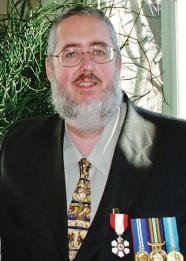The Mental Heath Advocate
Fall
2015
Spotlight on Hidden Physicists
The Mental Heath Advocate
Austin Mardon, Technical Supervisor, John Dossetor Health Ethics Center, University of Alberta
By:Austin Mardon, Technical Supervisor, Adjunct Faculty Member, John Dossetor Health Ethics Center, University of Alberta, Canada, Sigma Pi Sigma South Dakota State University Chapter, Class of 1986
 Becoming a scientist was a natural calling to me. Using my science background to face adversity—to rationalize the compulsive delusional thinking I developed when I fell sick to schizophrenia—was an unexpected development.
Becoming a scientist was a natural calling to me. Using my science background to face adversity—to rationalize the compulsive delusional thinking I developed when I fell sick to schizophrenia—was an unexpected development.
With my developed self-deprecating humor, I can now justify myself as a mad scientist.
Having a background in science helps me to understand the world with objectivity. I am always in awe of how the training I received surpassed mere information learning and set down the basis of my thought patterns.
I have been fond of problem solving since I was a child. I excelled in geophysics and astronomy classes at the University of Lethbridge in Alberta, Canada. Shortly after receiving my undergraduate degree in geography, I came across the opportunity to conduct field research work in Antarctica. Along with five other members of an expedition, I traveled 1,111 kilometers by snowmobile through the inner glaciers of this frozen continent and managed to recover over 700 meteorites. I, personally, found a carbon meteorite and a lunar one.
The trip was the most significant of my career. Unfortunately, it was also the hardest on my mental state and physical well-being, sparking the onset of my schizophrenia.
I could either indulge in my hallucinations or accept treatment and continue to stay aware of this world. At this crossroads, I chose sanity. Science had taught me that the world is beautiful and elegant. How could I discover its possibilities and find explanations if I could not distinguish reality from delusion? In comparison to the majority of people with schizophrenia, I could also turn to my schooling to understand the science behind my medications and their importance for recovery.
Outside of the calculations, graphs, and diagrams of my scientific career, I was able to break down my situation as a disabled person with a strong desire to learn and make the world a better place. Therefore I proceeded to pursue my master’s in geography and education and eventually a doctorate in geography. Nowadays I focus on writings, journal publications, and mental health advocacy. I am always looking for opportunities to educate the public about mental well-being with an assertive and rational tone.
Since I was awarded the Order of Canada and became a fellow of the Royal Society of Canada, I have often been compared to the great mathematician John Nash, who became more widely known through the movie A Beautiful Mind. Our mad scientist mentality and struggle to balance logic and hyper-creativity continue to intrigue many.
This story was written with the assistance of Jessica Wong.
